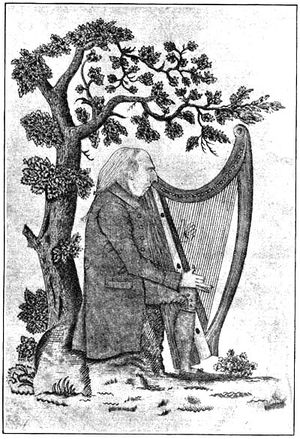Annotation:Planxty Miss Burke: Difference between revisions
(Created page with "=='''Back to [[{{BASEPAGENAME}}]]'''== ---- <p><font face="garamond, serif" size="4"> '''PLANXTY MISS BURKE''' ("Pleraca Ingean Ni Buaircac" or "Planxroe inghean Ni Bhuairchid...") |
m (Text replacement - "garamond, serif" to "sans-serif") |
||
| (2 intermediate revisions by one other user not shown) | |||
| Line 1: | Line 1: | ||
=='''Back to [[{{BASEPAGENAME}}]]'''== | =='''Back to [[{{BASEPAGENAME}}]]'''== | ||
---- | ---- | ||
<p><font face=" | <p><font face="sans-serif" size="4"> | ||
'''PLANXTY MISS BURKE''' ("Pleraca Ingean Ni Buaircac" or "Planxroe inghean Ni Bhuairchidh"). Irish, Air or Planxty (6/8 time, "lively"). D Major (O'Neill): B Flat Major (O'Sullivan/Bunting). Standard tuning (fiddle). AAB (O'Neill/Krassen): AABB (O'Neill/1850, O'Sullivan/Bunting). Composed by Turlough O'Carolan (1670-1738), although no words have survived, indeed, if any were written to the tune. O'Sullivan (1983) remarks the Burkes of County Galway were an important family in O'Carolan's time, though the particular person addressed is still unknown. The Burke family of Glinsk was of Norman extraction who had 'modern' aspirations, according to Gearóid Ó hAllmhuráin (1998). O'Sullivan suggests the melody may not have been composed for the family at all, as it appears in earlier, though inferior, versions in Lee's '''Collection''' (1780), Thompson's '''Hibernian Muse'''' (1786) and Mulholland's '''Collection''' (1810), in all under the title "[[John Kelly]]" (the name of two country squires of Connaught in O'Carlolan's time). Donal O'Sullivan, in his definitive '''Carolan: The Life, Times and Music of an Irish Harper''' (1958) declined to list the tune under the "Miss Burke" title, and gave it as "[[John Kelly]]," acknowledging in his notes to the air that Bunting called in "Planxty Miss Burke," but that the Belfast collector sometimes made mistakes and O'Sullivan thought this miss-titling was one. | '''PLANXTY MISS BURKE''' ("Pleraca Ingean Ni Buaircac" or "Planxroe inghean Ni Bhuairchidh"). Irish, Air or Planxty (6/8 time, "lively"). D Major (O'Neill): B Flat Major (O'Sullivan/Bunting). Standard tuning (fiddle). AAB (O'Neill/Krassen): AABB (O'Neill/1850, O'Sullivan/Bunting). Composed by Turlough O'Carolan (1670-1738), although no words have survived, indeed, if any were written to the tune. O'Sullivan (1983) remarks the Burkes of County Galway were an important family in O'Carolan's time, though the particular person addressed is still unknown. The Burke family of Glinsk was of Norman extraction who had 'modern' aspirations, according to Gearóid Ó hAllmhuráin (1998). O'Sullivan suggests the melody may not have been composed for the family at all, as it appears in earlier, though inferior, versions in Lee's '''Collection''' (1780), Thompson's '''Hibernian Muse'''' (1786) and Mulholland's '''Collection''' (1810), in all under the title "[[John Kelly]]" (the name of two country squires of Connaught in O'Carlolan's time). Donal O'Sullivan, in his definitive '''Carolan: The Life, Times and Music of an Irish Harper''' (1958) declined to list the tune under the "Miss Burke" title, and gave it as "[[John Kelly]]," acknowledging in his notes to the air that Bunting called in "Planxty Miss Burke," but that the Belfast collector sometimes made mistakes and O'Sullivan thought this miss-titling was one. | ||
<br> | <br> | ||
<br> | <br> | ||
</font></p> | </font></p> | ||
<p><font face=" | <p><font face="sans-serif" size="4"> | ||
[[File:arthuro'neill.jpg| | [[File:arthuro'neill.jpg|300px|thumb|right|Arthur O'Neill]] | ||
''Source for notated version'': Belfast musician and collector Edward Bunting noted the melody from harper Arthur O'Neill in 1800, according to the index of his 1840 collection. | ''Source for notated version'': Belfast musician and collector Edward Bunting noted the melody from harper Arthur O'Neill [https://en.wikipedia.org/wiki/Arthur_O'Neill_%28harpist%29] (c.1737-1816) in 1800, according to the index of his 1840 collection. | ||
<br> | <br> | ||
<br> | <br> | ||
</font></p> | </font></p> | ||
<p><font face=" | <p><font face="sans-serif" size="4"> | ||
''Printed sources'': Bunting ('''Ancient Music of Ireland'''), 1840; p. 43. O'Neill (Krassen), 1976; p. 238. O'Neill (Music of Ireland: 1850 Melodies), 1903; No. 672, p. 122. O'Sullivan/Bunting, 1983; No. 58, pp. 91-92. | ''Printed sources'': Bunting ('''Ancient Music of Ireland'''), 1840; p. 43. O'Neill (Krassen), 1976; p. 238. O'Neill (Music of Ireland: 1850 Melodies), 1903; No. 672, p. 122. O'Sullivan/Bunting, 1983; No. 58, pp. 91-92. | ||
<br> | <br> | ||
<br> | <br> | ||
</font></p> | </font></p> | ||
<p><font face=" | <p><font face="sans-serif" size="4"> | ||
''Recorded sources'': <font color=teal></font> | ''Recorded sources'': <font color=teal></font> | ||
</font></p> | </font></p> | ||
Latest revision as of 14:34, 6 May 2019
Back to Planxty Miss Burke
PLANXTY MISS BURKE ("Pleraca Ingean Ni Buaircac" or "Planxroe inghean Ni Bhuairchidh"). Irish, Air or Planxty (6/8 time, "lively"). D Major (O'Neill): B Flat Major (O'Sullivan/Bunting). Standard tuning (fiddle). AAB (O'Neill/Krassen): AABB (O'Neill/1850, O'Sullivan/Bunting). Composed by Turlough O'Carolan (1670-1738), although no words have survived, indeed, if any were written to the tune. O'Sullivan (1983) remarks the Burkes of County Galway were an important family in O'Carolan's time, though the particular person addressed is still unknown. The Burke family of Glinsk was of Norman extraction who had 'modern' aspirations, according to Gearóid Ó hAllmhuráin (1998). O'Sullivan suggests the melody may not have been composed for the family at all, as it appears in earlier, though inferior, versions in Lee's Collection (1780), Thompson's Hibernian Muse' (1786) and Mulholland's Collection (1810), in all under the title "John Kelly" (the name of two country squires of Connaught in O'Carlolan's time). Donal O'Sullivan, in his definitive Carolan: The Life, Times and Music of an Irish Harper (1958) declined to list the tune under the "Miss Burke" title, and gave it as "John Kelly," acknowledging in his notes to the air that Bunting called in "Planxty Miss Burke," but that the Belfast collector sometimes made mistakes and O'Sullivan thought this miss-titling was one.

Source for notated version: Belfast musician and collector Edward Bunting noted the melody from harper Arthur O'Neill [1] (c.1737-1816) in 1800, according to the index of his 1840 collection.
Printed sources: Bunting (Ancient Music of Ireland), 1840; p. 43. O'Neill (Krassen), 1976; p. 238. O'Neill (Music of Ireland: 1850 Melodies), 1903; No. 672, p. 122. O'Sullivan/Bunting, 1983; No. 58, pp. 91-92.
Recorded sources:
